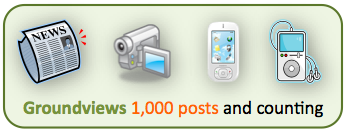When I first heard of Groundviews in 2006, I was delighted to see citizen journalism finding its place in Sri Lanka, creating a much needed avenue for citizens to express their views before an infinitely vast and globally distributed readership. The project has already rendered a tremendous service to Sri Lanka and her people, by providing a platform to share and debate ideas, and engage in lively exchanges. As I sit in front of a computer with Groundviews in mind, I am inevitably reminded of my own past, to a bygone period spent in beautiful central Sri Lanka. The first time I heard the word ‘computer’ was at the early age of about eight, somewhere around 1990, at primary school in Trinity College, Kandy. Trinity had already introduced a class in ‘computing’ in the junior school. The ‘computer room’ looked more like a ‘TV room’, with two massive television screens and equally sized keyboards (which, when compared with today’s keyboards, would constitute the prehistory of computing accessories). The computer class was definitely not among my favourite lessons, as the teacher was extremely strict, and I still think she was way too strict for a primary school. This first acquaintance with computers continued at a slow but relatively steady pace, with compulsory ‘computer lessons’ until my secondary education ended in 2001. At the beginning of the new millennium, as Sri Lanka stumbled on her way to the age of the computer as the indispensable machine, I left the island on voluntary exile. Some seven years later, the information technology landscape of Sri Lanka has seen dramatic transformations, in keeping with global trends. While noting the long way ahead in extending the fruits of information technology beyond the urban metropolis, and in moving the state towards ‘e-government’, our nation has indeed made progress in these areas. The multiplicity of news websites in all three languages, the thriving world of Sri Lankan blogging and the fact that more and more governmental organs have websites are some examples. Pondering on avenues for improvement, one cannot afford to ignore the necessity of propagating information technology in the sectors of primary, secondary and third level education. It goes without saying that any measures to reach this goal should place added emphasis on the Northern and Eastern Provinces, as Colombo owes over two and half decades of development to the young people of these regions.
Growing up in challenging times
As Groundviews comes of age, its successes over the past three years are highly significant, given the backdrop against which it has survived. It operates from a state where ‘politics of patronage’ govern the functioning of the majority of media institutions. This tendency is primarily apparent in the state-owned media, which, despite changes in ruling governments, have continuously played the role of media channels for governments in power. Their coverage of news and current affairs does not provide space for opposed views, ideas of dissent, critical dialogue on public policy – all of which are essential to a healthy society under democratic governance. Privately owned media institutions have woes of their own. They either support governments in power, providing little or no space for opposition and dissent, or, they are forced to engage in desperate attempts at maintaining impartiality at the expense of their very existence. Some private media organisations in particular, demonstrate a commitment to provide an equal level of attention to different sections of the polity and society. Some media groups, including a newspaper that pioneered journalism of dissent in Sri Lanka, have suffered irrecoverable losses due to the fatal error of actively engaging in the profession of journalism.
Issues of to press freedom in Sri Lanka have been the subject of many articles and scholarly renderings on Groundviews and elsewhere and therefore do not require further reiteration here. Threats to press freedom are a wider global phenomenon that can be observed in many parts of the world. The way forward lies in collective efforts by the wider public to make a difference, and help create a society where conflicting perspectives are rendered more and more welcome. In this process, citizen journalism can play a key role, as the Groundviews experience amply demonstrates. The very success of Groundviews demonstrates the necessity of a sea change in the ethics and practice of (print and electronic) journalism in Sri Lanka. Time has come for policymakers (of all sides) to accept the reality that the ‘state-owned’ media are mere ‘public assets’ meant at ensuring the dissemination of information, and that they can only be ‘governed’ by the freedom of information. Their misuse for narrow, short-term political gain is an act worthy of wholehearted condemnation.
Finally, it may not be wrong to affirm that we live in the era of the quintessential Sri Lankan paradox: a thriving blogsphere marked by a tremendous commitment to the expression of ideas, successful citizen journalism, innovative print and electronic media, coupled with incentives for political patronage, violence against media personnel and an overly politicised (state) media. The rift between the ‘progressive-future-oriented’, and the ‘ever stagnating-political patronage-oriented’ characterise the Sri Lankan media of our times. Groundviews stands as the epitome of hope for a bright future on the progressive path.

